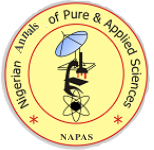Effects of Abattoir Effluents on Heavy Metal Tolerance, Bacteriological Quality and Physicochemical Parameters of Contaminated Soil in Yola, Adamawa State, Nigeria
DOI:
Keywords:
Abattoir Effluents, Soil Bacteria, Heavy Metals, Minimum Tolerance ConcentrationAbstract
This study was carried out to evaluate the effect of effluent produced from Yola abattoir on the heavy metals, the physicochemical parameters and the bacteriological quality of the contaminated soil. Stratified sampling technique was used to collect soil samples from the abattoir environment. Isolation of bacteria, cultural and biochemical characteristics were assessed using pour-plate and conventional techniques. Heavy metals presence was determined using atomic absorption spectrophotometer (AAS). Heavy metal tolerance by bacteria was done by agar plate method. The molecular identification was carried out using 16S rRNA gene of the bacteria. All data obtained were subjected to statistical analyses using analysis of variance (ANOVA) and t-test. Total bacterial count ranged from 6.19 x 105 and 8.50 x 105 CFU/mL. Bacterial species of Pseudomonas, Klebsiella, Staphylococcus, Bacillus, Streptococcus, Staphylococcus and Escherichia coli were isolated and identified. The highest mean value of the physicochemical parameters for pH, organic carbon, total nitrogen content, water holding capacity, total solid and total suspended solid of the effluent contaminated soil were 7.03, 7.97 %, 13.76 %, 2.48 %, 3346 g/cm, 1263 mg/L and 872 mg/L respectively. The minimum tolerance concentration of 50 ppm for copper, iron, zinc and cobalt was observed with a bacterium identified to be a strain of Pseudomonas aeruginosa. The isolated and identified Pseudomonas aeruginosa HBS2 strain has the potential to be used in bioremediation
Downloads
Published
How to Cite
Issue
Section
License
Copyright (c) 2021 MI Ja’afaru, OM Adeyemo, CH Okafor, P Bristone

This work is licensed under a Creative Commons Attribution-ShareAlike 4.0 International License.



 Contact Us
Contact Us Editorial Team
Editorial Team Join As A Reviewer
Join As A Reviewer  Request For Print Copy
Request For Print Copy


 Cprint Publishers
Cprint Publishers